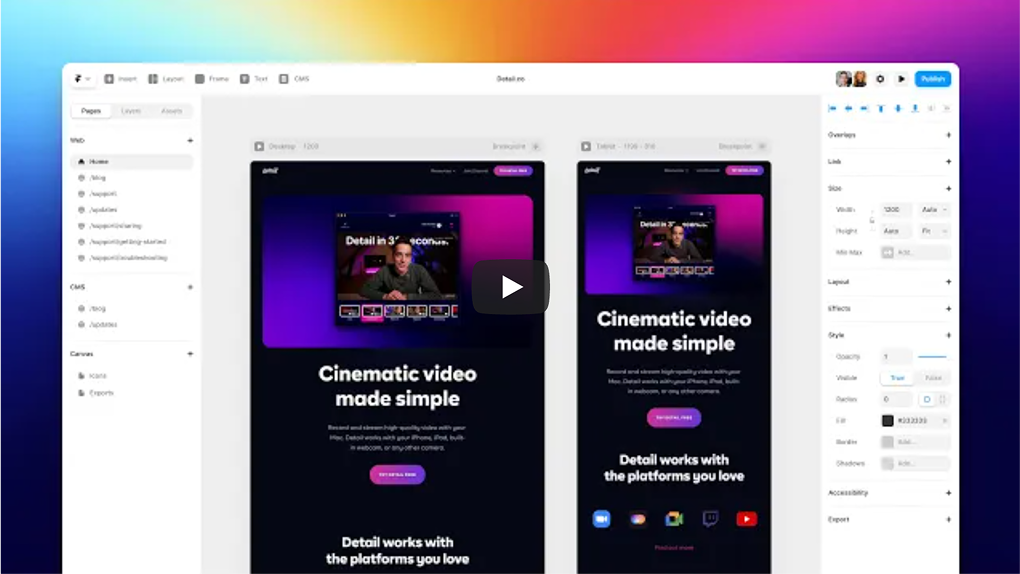
Improve your win rate, consistently!
October 13, 2022

In so many conversations that we have with clients, there’s one business metric they all seem to converge at — win rate! The challenge is not merely on how to improve their win rate, but how to do so consistently.
Achieving or surpassing the target win rate is probably one of the most important and relevant metrics in an organization. It is what every other metric rests upon. So, it’s not surprising that companies invest a lot of time and money in ensuring their teams are well-equipped to meet that target. Nonetheless, they often fall short of the mark because the journey to a consistently improving win rate is complex. There isn’t a simple ‘act fast and implement’ formula for it. There are many factors that influence win rate and to expect leaders to address them all at once is not practical.
We’ve found that while most companies have processes in place and intermediate sales training to tackle some of the more obvious reasons for falling win rates, what teams really need are specific power skills that allow them the behavioral scope for performing their jobs well. Each of these skills correlates to a business problem that directly affects the win rate.
To explain this further, we did a deep-dive into the various aspects of a sales journey to identify the most relevant power skills that an organization must build in their sales team so that they can easily glide towards an improved win-rate. Here are some questions that you need to ask as you take the plunge:
Is your sales team curious and prepared?
More often than not, your sales team is aware of why a prospect could not convert. Therefore, pre-sales is an incredibly layered process that most people do not follow entirely. It requires teams to identify challenges, gaps and threats in their sales journey, gather information about the customer and prepare accordingly. There are two power skills that play an essential role in making this happen: Curiosity, and Planning and Organizing.

Curiosity is defined as the ability to be driven by eagerness, logic and realistic observations to explore and seek out novel information or experiences.
This power skill allows teams to explore information through eagerness and acquire all the necessary information before making a choice. Step one of the sales process relies on this skill as it leads to tangible results.
- Mapping client scope: Teams are able to dig deeper into client requirements. This also includes peeking into clients’ pockets to get a better understanding of their purchasing power and pitching pricing accordingly.
- Staying in the real world: Teams are able to overcome assumptions and biases that come in the way and rely on logical, realistic observations.
- Making informed decisions: Teams are keen to learn what is new in the market and understand potential better by probing before pitching which makes negotiating with the client easier.
Planning and Organizing is the ability to decide in advance what needs to be done and set up a systematic plan of action bound by time, objectives, priorities and resources.
This power skill allows teams to overcome obstacles in sales cycles and lead with a plan for all possible situations. This can include an array of possible scenarios and situations that might arise. For teams to beat the biggest roadblock in their sales cycle, i.e. rejection, they need to be prepared for what’s to come.
- Preparing rebuttals: Teams are able to prepare counters and rebuttals for common client objections by deep-diving into what the client might be looking for.
- Foreseeing potential risks: Teams are able to understand and breakdown factors like competition, seasonal change, etc. to stay ahead of the tide and overcome any obstacle.
- Being self-aware: Teams are able to assess self strengths and weaknesses and make their next move accordingly
- Having a plan, always: Teams are able to act instantly in the case of any escalations or dissonance because they always have a plan ready. They have visualized possible scenarios and are able to alter their approach as per client geography, age, income, or other factors.
Is your team able to understand client needs?
This might seem simpler than it actually is. Understanding client needs requires more than Curiosity. It needs teams to be able to dig much deeper, make clients feel heard and develop a better understanding of how each client thinks. The power skill that comes into play here is an emotional intelligence trait: Empathy. It’s that step-up that most teams skip in their pursuit of a client.
Empathy is the emotional ability to understand, share and anticipate the feelings of another.
This power skill allows teams to make clients feel heard and put themselves in customers’ shoes. In the absence of this skill, teams are often unable to tap into the exact pain points of the customer, thus failing to offer them the best solution. Empathy is oftentimes a game changer as it plays a big role in establishing long-lasting client relationships.
- Understanding client motivations: Teams are able to get to the heart of what motivates a client towards the product and dig deeper into the value it can add to their lives.
- Tapping on emotions: Teams are able to get clients to open up about their specific needs which allows them to see the client’s perspective in order to map out and customize the best pitch.
- Gaining trust of the client: Teams are able to offer uniqueness to each client and reinforce the value they add, thus making them feel special and gaining their trust so that they claim more benefits
Is your team influential?
Every successful sale is made on the back of solid influence. Influencing your customers is usually considered as one of the most important ingredients of sales. However, it is approached in a very fragmented manner. We’ve identified that influence doesn’t work alone but in conjunction with a determination to get the job done. Therefore, the two power skills closely associated with this are: Influencing People and Bias To Action.

Influencing People is the ability to modify and affect a person’s thinking, sentiment, behavior, or general perception toward some object or issue through request, reason, demand or indirect methods.
This power skill is usually the most high priority skill in sales and customer experience teams because it allows teams the ability to expertly guide a buyer towards a favorable decision and change the client’s perception. It usually kicks in at the deciding stage of a sale where the right move can either complete or break the sales cycle.
- Being an advisor: Teams are able to present themselves to clients as advisors and not salespersons because no one is interested in products today, they want solutions.
- Telling a story that matters: Teams are able to build a story and narrative that connects the client’s pain point to a specific feature of the product.
- Responding promptly to requests: Teams are able to timely act on requests and focus on delivery of service that will deeply impact customer perception of the product.
- Focussing on decision makers: Teams are able to identify the decision makers and share customer testimonials with them and pick up on non-verbal cues
- Acting on feedback: Teams are able to show clients that they’re being attended to actively by being open to feedback and taking immediate action on it.
Bias to Action is the ability to be a self-starter, assess a situation or opportunity, take action without waiting for a command from someone else, and proactively overcome barriers while achieving the desired goal.
The culmination of all of the above power skills is this one skill that can help eliminate loopholes in the process to a large extent. This skill allows teams the ability to single-handedly resolve basic problems, and continuously learn and build upon doing this better.
- Giving quick resolutions: Teams are able to resolve problems quicker and go back to clients with solutions sooner rather than later.
- Reducing any dependencies: Teams are able to not be dependent on managers, thus saving their time for smaller obstacles and leading to lesser irate clients.
- Becoming more confident: Teams are able to with time become confident in handling clients and tend to take up more responsibilities out of sheer eagerness.
- Upselling to clients: Teams are able to upsell to existing clients and help other team members in dealing effectively with clients.
Is your team persistent and gritty?
At the end of the day, the goal that your team is chasing is to meet the target win rate which can only be done if they close maximum sales. The sales cycle can sometimes reach the turning point and collapse. In the face of that, a team needs to remain focused and have a positive outlook. While most people would agree that Resilience is a power skill that plays a big role here, we’ve narrowed down two very critical skills that help close the loop: Result Orientation and Optimism.

Result Orientation is the strong drive towards target achievement. It is the ability to purposefully create and accomplish goals while also prioritizing, raising achievability standards and working within timeframes.
This power skill is largely underrated and taken for granted especially in sales. Therefore, it is a skill that most teams do not fully develop. This skill allows the team to keep their eyes on the end goal i.e. target achievement with laser sharp focus while ensuring top quality delivery of work. This is easier said than done as it involves a lot of underlying internal factors within an organization which can potentially become a big roadblock in sales.
- Eliminating sore points: Teams are able to take on heavy targets without complaining and redirect energies into whatever needs to be done to achieve their goal.
- Setting personal targets: Teams are able to set personal targets that contribute to the larger goal which helps enhance productivity.
- Influencing the team positively: Teams are able to build smooth internal processes, positively influence and help others by being more productive.
- Increasing clients: Teams are able to look beyond, nurture all leads and book quality appointments so they have more chances of repeated clients and reduced irate clients.
Optimism is the ability to maintain a positive outlook and operate with persistence even in the midst of adversity or suffering from setbacks.
The bitter truth about sales is that despite having done things right, you might face rejection. This power skills allows teams to not give up in the face of rejection and stay hopeful of things working out. It is the last-mile effort that can lead to fulfilling results. The final stage of the sales cycle is where most people give up. Optimism can help your teams give that final push which lands you a win.
- Treating each lead as a customer: Teams are able to consider each lead as a potential sale which means they put in their 100 per cent every step of the way despite pushback.
- Seeing objections as opportunities: Teams are able to gain crucial insights from objections that help them innovate and come up with more powerful strategies.
- Keeping the client engaged: Teams are able to not drop the ball at any point by keeping in touch with the client even if it is through small talk or continuous follow-ups.
- Removing any roadblocks: Teams are able to make all possible escalations to potentially eliminate concerns and ensure a smooth client experience.
Improving your win rate requires an approach that is embedded in an organization’s system. Power skills play a huge role in maximizing team performance and this impacts business metrics dramatically. Investing deeply in upskilling teams on specific power skills to solve for critical metrics is an obvious way forward for ambitious organizations who want to build long term solutions to business problems.
To take actionable steps to improve your win rate, visit Fundamento.



